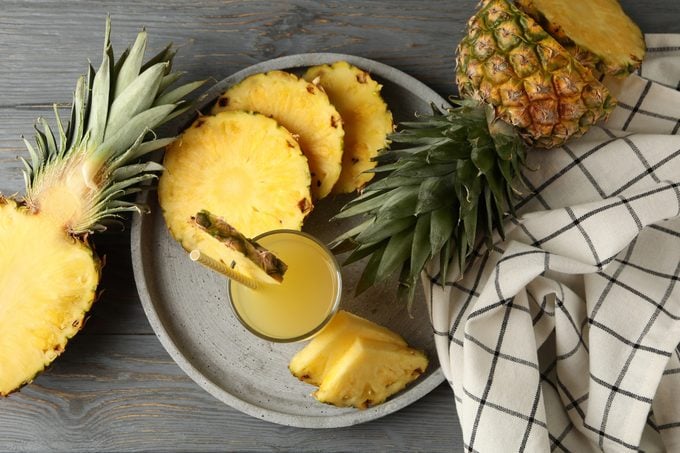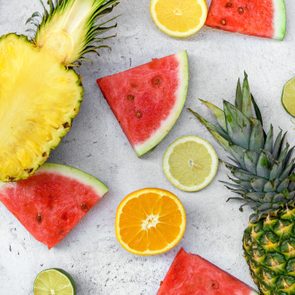4 Pineapple Juice Benefits You Should Know About
Updated: Aug. 23, 2021
This tasty tropical drink is surprisingly healthy. Here are the benefits of drinking pineapple juice.
Our editors and experts handpick every product we feature. We may earn a commission from your purchases.
Why drink pineapple?
Do you drink pineapple juice? It’s delicious, just like the fruit.
“It tastes like pineapple, though slightly sweeter with a hint of citrus,” says registered dietitian nutritionist Mary Ellen Phipps, author of The Easy Diabetes Cookbook.
Not only is pineapple juice super tasty, but it also boasts many nutritional benefits.
“Pineapple is rich in vitamin C, manganese, copper, and vitamin B6,” says Phipps. “All of these play a role in wound healing and supporting a healthy immune system.”
In addition, it is rich in antioxidants and bromelain, a group of enzymes that may help reduce inflammation.
Keep reading to find out more about the benefits of drinking pineapple juice.
Pineapple juice nutrition
Here’s information on the nutritional value of pineapple juice. This includes the daily value (DV) for notable nutrients, for an 8-ounce serving.
Calories: 120
Fiber: 1 gram (g) (4 percent daily value)
Protein: 0 g (0 percent daily value)
Carbs: 30 g (1 percent daily value)
Vitamin C: 72 milligrams (mg) (80 percent daily value)
Calcium: 19 mg (1 percent daily value)
Iron: .36 mg (2 percent daily value)
Types of pineapple juice
Most often, you’ll find pineapple juice in a can. Some pineapple juice is fortified with vitamin C.
Once a can of pineapple juice is open, you’ll need to seal it, place it in the refrigerator, and consume it within five to seven days.
You’ll also find pineapple juice in cartons and bottles. “Light” pineapple juice is another option; it contains water to reduce the calorie and sugar content.
No matter which type you choose, it’s best to look for 100 percent juice, with no added sugars.
(Here are other things nutritionists want you to know about pineapple.)

Where pineapple juice comes from
Pineapple juice comes from the pineapple fruit, a tropical plant also known as Anasas comosus, according to A Complete Course in Canning and Related Processes.
Pineapple juice usually comes from the Smooth Cayenne, Abacaxi type, and the Queen pineapples.
People blend and can the juice from these pineapples to sell. Sometimes, the juice is clarified, further refined, or concentrated.
This may yield some of the syrup that is common in canned pineapple.
Disease-fighting benefits of pineapple juice
Just like the pineapple fruit, pineapple juice offers many health benefits.
“Pineapples are a source of the antioxidants vitamin A and vitamin C,” says registered dietitian nutritionist Lacy Ngo, author of The Nourishing Meal Builder. “Diets high in antioxidants have been shown to reduce the risk of many chronic diseases such as heart disease, diabetes, and cancer.”
In fact, antioxidants are one of the key nutritional factors in fighting disease.
“Study after study has linked antioxidants to disease prevention,” says Ngo. “To get a variety of these antioxidants, we should be eating fruits and vegetables at every meal. Pineapple juice is one delicious way we can add more of these amazing antioxidants to our day.”
Pineapple juice may be good for your respiratory tract, too.
“Bromelain and antioxidants have been linked to improved seasonal allergy symptoms and asthma control,” adds Ngo.
Nutrient health benefits of pineapple juice
What is pineapple juice good for?
“The nutritional benefits of pineapple juice include supporting healthy immunity and suppressing inflammation,” says registered dietitian nutritionist Kathy Siegel, owner of Kathy Siegel Nutrition and author of Eating Clean Vegetarian Cookbook.
“One cup of 100 percent pineapple juice fortified with vitamin C contains 110 milligrams of vitamin C—vitamin C is necessary for the growth and repair of cells and is essential for a healthy immune system.”
Diets higher in vitamin C link with improving the appearance of aging skin, adds Ngo.
Another nutrient you’ll get from pineapple juice: bromelain.
“This [enzyme group] may help with digestion and reduce inflammation, a common risk for heart disease,” adds Siegel. “Bromelain may also help your body fight pain and reduce swelling after surgery or strenuous exercise.”
The bromelain benefits don’t stop there.
“Research suggests it may help reduce negative gastrointestinal effects for people with GI disorders, promote heart health, protect against cancer, and more,” adds Phipps.
Plus, pineapple juice boasts potassium, an electrolyte that can help with rehydration after intense exercise or even a night of drinking.
Pineapple juice concerns or risks
As with most juices, you don’t get much fiber from pineapple juice.
“Pineapple juice is rich in nutrients, but it is higher in carbohydrates and sugar—and contains little to no fiber from the actual pineapple fruit,” says Phipps. “As with any type of fruit juice, it should be consumed in moderation.”
And always aim to purchase pineapple juice with no added sugar. “Juice from concentrate and 100 percent fruit juice are both great choices,” says Siegel. “Concentrated juice simply means that the water has been extracted for storage.”
While pineapple juice with no-added-sugar contains naturally occurring sugar, this is not the type that you need to worry about.
“Pineapples contain natural sugar instead of refined sugar,” says Ngo. “While refined sugar has been linked to an increased risk of many diseases, including diabetes and heart disease, pineapples appear to do the opposite—in that the antioxidants in pineapples and pineapple juice may help reduce the risk of heart disease and diabetes.”
Pineapple juice side effects
The major thing to be aware of with pineapple juice is that it contains bromelain, which may interact with some medications such as antidepressants and anticonvulsants, notes Siegel.
This is why it’s important to speak to your doctor before consuming large amounts of pineapple juice.
“And due to its high acidity, large amounts of pineapple juice may be irritating for people with acid reflux,” says Phips. “Also, for people with diabetes, pineapple juice would be an effective way to treat low blood sugar. But under normal circumstances, it should be consumed in moderation with a meal or snack that has fiber and protein.”
People with diabetes can be at risk for lower blood sugar if they use insulin. However, most of the time people with diabetes are at greater risk for high blood sugar.
How to make pineapple juice
If you love a good kitchen project, here’s exciting news: You can easily whip up pineapple juice or pineapple water in your own home.
“You can make your own juice using a fresh whole pineapple,” explains Ngo.
First, cut off the stem and peel the pineapple. After you’ve peeled the pineapple, you’ll need to remove the eyes. “The eyes are the little brown circles all over the peeled pineapple,” she says.
Next, cut the pineapple into chunks and add the chunks to your blender along with some ice and water. Now you simply blend and, voila, you have pineapple juice!”
Of course, you can use a juicer, but you don’t need any fancy equipment to make your own pineapple juice.
Try using it in place of whole pineapple in this healthy pineapple smoothie recipe
Recipes with pineapple juice
While pineapple juice is delicious on its own, it also makes a great addition to these recipes:




















